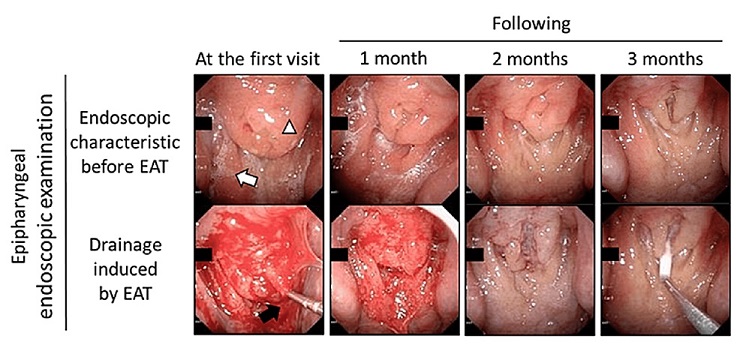Long COVID News: Japanese Researchers Find Cure For Post-COVID Chronic Coughs Associated with Chronic Epipharyngitis Using Zinc Chloride
Long COVID News - Post COVID Chronic Coughs- Cure Jan 15, 2023 2 years, 11 months, 4 weeks, 27 minutes ago
Long COVID News: Chronic coughs is a constant issue seen in many post-COVID individuals and unknown to many, the reason behind this is a secondary upper respiratory tract infection (URTI) known as Chronic Epipharyngitis caused as a result of exposure to the SARS-CoV-2 virus causing the epipharyngeal mucosa to become inflamed.

Chronic epipharyngitis is considered a residual immune response and causes not only various upper respiratory tract symptoms, such as postnasal drip, throat pain, and cough, but also systemic symptoms, such as chronic fatigue, headache, systemic pain, and dizziness.
Thailand Medical News had previously covered about Post COVID coughs caused by Omicron infections in our previous
Long COVID News coverages.
https://www.thailandmedical.news/news/post-omicron-coughs-are-real-and-getting-to-be-common-with-the-throat-and-airways-being-in-a-state-of-low-but-persistent-inflammation-do-not-ignore
Researchers from Fukuoka Dental College-Japan and Fukuoka University- Japan have developed a new treatment protocol to get rid of the condition that often leads to chronic coughs by using zinc chloride as an anti-inflammatory agent.
It has already bene long established that a major target of severe acute respiratory syndrome coronavirus 2 (SARS-CoV-2) is the epipharyngeal mucosa.
https://www.sciencedirect.com/science/article/pii/S1933021922001325
https://iv.iiarjournals.org/content/36/1/371
Epipharyngeal abrasive therapy (EAT) is a Japanese treatment for chronic epipharyngitis. EAT is a treatment for chronic epipharyngitis in Japan that involves applying zinc chloride as an anti-inflammatory agent to the epipharyngeal mucosa.
The study team presented a case of a 21-year-old man with chronic coughing that persisted for four months after a diagnosis of mild coronavirus disease 2019 (COVID-19), who was treated by EAT.
The study team diagnosed chronic epipharyngitis as the cause of the chronic cough after the SARS-CoV-2 infection. SARS-CoV-2 spike RNA had persisted in the epipharyngeal mucosa of this Long COVID patient. EAT was performed once a week for three months, which eliminated residual SARS-CoV-2 RNA and reduced epipharyngeal inflammation. Moreover, a reduction in the expression of proinflammatory cytokines was found by histopathological examination.
The study team speculated that the SARS-CoV-2 virus was excreted with the drainage induced by EAT, which stopped the secretion of proinflammatory cytokines. This case study suggests that EAT is a useful treatment for chronic epipharyngitis involving long COVID.
The study findings were published in the peer reviewed journal: Cureus
or-chronic-cough-in-long-covid-patients-clearance-of-epipharyngeal-residual-sars-cov-2-spike-rna-by-epipharyngeal-abrasive-therapy">https://www.cureus.com/articles/132026-a-potential-novel-treatment-for-chronic-cough-in-long-covid-patients-clearance-of-epipharyngeal-residual-sars-cov-2-spike-rna-by-epipharyngeal-abrasive-therapy
The epipharynx, located behind the nasal cavity, is responsible for mucosal immunity through both innate and acquired immunity as a component of mucosa-associated lymphoid tissue (MALT).
https://www.mdpi.com/1422-0067/23/16/9205
https://www.mdpi.com/1422-0067/23/2/727
The epipharyngeal ciliated epithelium is a major target of the SARS-CoV-2 coronavirus because of its high expression of viral entry factors angiotensin-converting enzyme 2 (ACE2) and transmembrane protease serine 2 (TMPRSS2).
Chronic epipharyngitis is considered a residual immune response after upper respiratory tract infections including COVID-19 disease and causes various upper respiratory tract symptoms.
https://www.mdpi.com/1999-4915/14/5/907
It has been reported that >90% of Long COVID patients suffer from moderate-to-severe chronic epipharyngitis. Endoscopic findings such as mucosal redness, swelling, and mucus adhesion are important for the diagnosis of chronic epipharyngitis.
https://www.aurisnasuslarynx.com/article/S0385-8146(22)00223-1/fulltext
https://www.mdpi.com/1999-4915/14/5/907
EAT or epipharyngeal abrasive therapy is a Japanese treatment protocol for chronic epipharyngitis, which abrades the epipharyngeal mucosa with a cotton swab containing zinc chloride with anti-inflammatory effects.
Interestingly, continuous EAT down-regulates the expression of viruses entry factors via squamous metaplasia and reduces major proinflammatory cytokines such as interleukin 6 (IL-6) and tumor necrosis factor-α (TNF-α) in patients with chronic epipharyngitis.
https://iv.iiarjournals.org/content/36/1/371
https://www.mdpi.com/1422-0067/23/16/9205
https://iv.iiarjournals.org/content/36/5/2357
Hence, EAT improves various upper respiratory tract symptoms including acute chronic cough associated with chronic inflammation of the epipharynx.
 Effect of Epipharyngeal abrasive therapy (EAT) in the patient.
Effect of Epipharyngeal abrasive therapy (EAT) in the patient.
Upper panels show endoscopic characteristics before EAT at the first visit and 1, 2, and 3 months. The white triangle indicates swelling of the epipharyngeal mucosa. The white arrow indicates mucus adhesion. Lower panels show bleeding induced by EAT at the first visit and 1, 2, and 3 months. The black arrow indicates a sterile nasal cotton swab containing zinc chloride.
It has also been reported that the reduction of inflammation of the epipharynx by EAT is also effective for the systemic symptoms of Long COVID. However, the mechanism of residual epipharyngeal inflammation and the efficacy of EAT in Long COVID patients remains unclear.
While it has been reported that SARS-CoV-2 spike RNA persistence in the human body at autopsy, this study finding also shows that SARS-CoV-2 RNA persists in the epipharyngeal mucosa of a Long COVID patient.
https://www.nature.com/articles/s41586-022-05542-y
Importantly, SARS-CoV-2 antigen persistence in infected tissues affects host immune responses indicating that viral RNA persistence in the epipharynx may be a mechanism for protracted epipharyngitis in Long COVID patients.
https://linkinghub.elsevier.com/retrieve/pii/S0016508522004504
Importantly, EAT eliminated residual SARS-CoV-2 RNA and improved epipharyngeal inflammation. The study team speculates that the viral antigen was excreted along with the drainage induced by EAT and the elimination of the cause of inflammation suppressed the secretion of proinflammatory cytokines, which are closely related to driving cough via neuroimmune interactions.
https://www.thelancet.com/journals/lanres/article/PIIS2213-2600(21)00125-9/fulltext
Gabapentin and pregabalin, which are neuromodulators, are considered to be effective in controlling chronic refractory cough in Long COVID, whereas the study team suggests that EAT is a potential novel treatment in terms of removing the cause of cough rather than symptomatic treatment.
https://www.thelancet.com/journals/lanres/article/PIIS2213-2600(21)00125-9/fulltext
EAT suppresses the inflammation related to persistent viral RNA after infection resolution and the host counter-response, including overproduction of cytokines such as IL-6 and TNF-α, which are presumed to be the cause of Long COVID, in the epipharynx.
https://www.sciencedirect.com/science/article/pii/S1684118222001864?via%3Dihub
At present, chronic cough is a frequent symptom in Long COVID patients and it has been reported that about 10% of their non-hospitalized patients had cough over four months after SARS-CoV-2 infection.
https://academic.oup.com/cid/article/73/11/e4058/6012625?login=false
Since the epipharynx is anatomically visible only by endoscopic examination, inflammation is often overlooked. In Long COVID patients without lower respiratory tract disorders, who suffer from a chronic cough, it is necessary to focus on upper respiratory tract disorders including chronic epipharyngitis.
The study findings propose that EAT is useful as a treatment for chronic epipharyngitis involving Long COVID. As it suppresses the expression of proinflammatory cytokines in the epipharynx that cause coughing.
Furthermore, EAT cleared residual SARS-CoV-2 RNA in the epipharynx. As a result, EAT may be effective in improving upper respiratory tract symptoms in Long COVID patients.
For the latest
Long COVID News, keep on logging to Thailand Medical News.

